Tribunal Statistics Quarterly: July to September 2024
Published 12 December 2024
1. Main Points
This publication presents tribunals statistics for the latest quarter (July to September, Q2 2024/25), compared to the same quarter of the previous year. It also includes annual data for the Special Educational Needs and Disability (SEND) Tribunal for the 2023/24 academic year. The collection page with links to the accompanying documents for this publication can be found here.
This publication does not include all the tribunals – Upper Tribunal Immigration and Asylum (UTIAC) and the jurisdictional breakdown of ET are excluded. The total of the remaining jurisdictions is referred to in the accompanying tables as the ‘Interim Total’ and has been provided to allow like-for-like comparisons over time.
We have removed the median and quartile measures from the latest publication while we work together to review the way aggregate timeliness is recorded from caseload data. Initial investigations suggest the current methodology can lead to errors in the median and percentile calculations, but that the means are unlikely to be affected.
Data from the missing tribunals will be published as soon as they become available, and are quality assured.
| The interim[footnote 1] overall volume of receipts and open cases have increased, while disposals have decreased | In July to September 2024 His Majesty’s Courts & Tribunals Service (HMCTS) recorded an 8% increase in the interim[footnote 1] total for receipts, and a 10% decrease in the total for disposals, compared to the same quarter in 2023. Receipts have exceeded disposals over the last year, resulting in a 6% increase in open caseload to 683,000 at the end of September 2024. |
| SSCS receipts and disposals decreased whilst open cases increased | Compared to the same period in 2023, Social Security and Child Support (SSCS) receipts decreased by 7% and disposals decreased by 7%. Receipts have exceeded disposals over the last year, resulting in a 5% increase in open cases. The decrease in receipts was driven by decreases in Personal Independence Payment and Universal Credit (by 10% and 5% respectively). The decrease in disposals was driven by decreases in Personal Independence Payment and Disability Living Allowance (by 14% and 26% respectively). |
| FTTIAC receipts and open cases increased, and disposals remained stable | FTTIAC receipts increased by 28%, while disposals remained stable in July to September 2024 compared to the same period in 2023. Over the last year, receipts have exceeded cases disposed of, leading to an increase in open caseload of 104%. |
| Employment Tribunal receipts and open caseload increased, while disposals decreased [footnote 2] | Single Employment Tribunal (ET) receipts increased by 19%, while disposals decreased by 8% in Q2 2024/25, compared to the same period a year ago. Open caseloads also rose by 26% over the same period as receipts have exceeded disposals over the last year. In Q2 2024/25 lead multiple ET receipts and disposals decreased by 33% and 3% respectively compared to the same period a year ago. Open cases increased by 14% over the same period, as receipts have outweighed disposals over the last year. |
| Gender Recognition Certificates receipts and disposals decreased, while open caseload increased | This quarter there were 350 Gender Recognition Panel (GRP) applications received, 340 disposals and an open caseload of 900. GRP receipts and disposals decreased, while open caseload increased (by 6%, 27% and 22% respectively) in Q2 2024, compared to the same period in 2023. Although both receipts and disposals have fallen compared to Q2 2023/24, there have been more receipts over the last year than disposals, resulting in an increase in open caseload. |
| SEN appeals and disposals up 55% and 43% respectively | In the academic year 2023/24, HMCTS tribunals recorded 21,000 registered appeals in relation to SEN, an increase of 55% compared to the prior year. In the same period, 17,000 SEN appeals were disposed of, an increase of 43% on 2022/23. The open caseload for the SEND tribunal has increased by 57% from the end of September 2023 to the end of September 2024, as receipts have continued to exceed disposals over the last year. |
For feedback related to the content of this publication, please contact us at CAJS@justice.gov.uk
2. Statistician’s Comment
This quarter there was an increase in overall Tribunals receipts compared to the same period in 2023/24. However, disposal numbers have decreased, resulting in a 6% increase in open caseload. The increase in receipts is driven by a continued elevation in FTTIAC claims, in addition to continued increase in SEND. The rise of FTTIAC claims has been caused by Home Office tackling its legacy asylum decision backlog. The drop in disposals is driven by a decrease in ET multiple claims, which are prone to volatility, and Social Security and Child Support over this period.
The annual Special Educational Needs and Disability (SEND) data included in this publication shows that receipts and disposals continue to increase, as has been the case for the past 8 years, both reaching new maximums. Throughout this period, the level of registered appeals has been above the outcomes decided, also leading to an increase in the SEND open caseload. Open caseload at the end of Q2 2024/25 is 57% higher than that in the same period in 2023/24.
3. Overview of Tribunals
The receipts total was 94,000 and the disposals total was 74,000 in Q2 2024/25
In July to September 2024, HMCTS recorded an 8% increase in the total for receipts, and a 10% decrease in the totals for disposals, when compared to the same quarter in 2023. Over the year, receipts exceeded disposals and the open caseload total increased by 6%, to 683,000, over the same period.
This publication does not include Upper Tribunal (Immigration and Asylum Chamber) data from Q2 of 2021/22 and Employment Tribunals data for Q1 2021/22 due to database migration as stated above. The total of the remaining jurisdictions is referred to in this publication and accompanying tables as the ‘Interim Total’ and has been provided to allow consistent year-on-year comparisons over time.
This summary bulletin focuses mainly on the Social Security and Child Support (SSCS) Tribunal, the First-tier Tribunal Immigration and Asylum Chamber (FTTIAC), and the Employment Tribunal as they made up the majority (75%) of tribunal receipts in July to September 2024:
- Social Security and Child Support (SSCS) - 35% of receipts
- Employment Tribunal (ET) - 25% of receipts
- First-tier tribunal Immigration and Asylum Chamber (FTTIAC) - 14% of receipts
Figure 3.1: Receipts interim totals, Q2 2020/21 to Q2 2024/25 (Source: Table S_2)
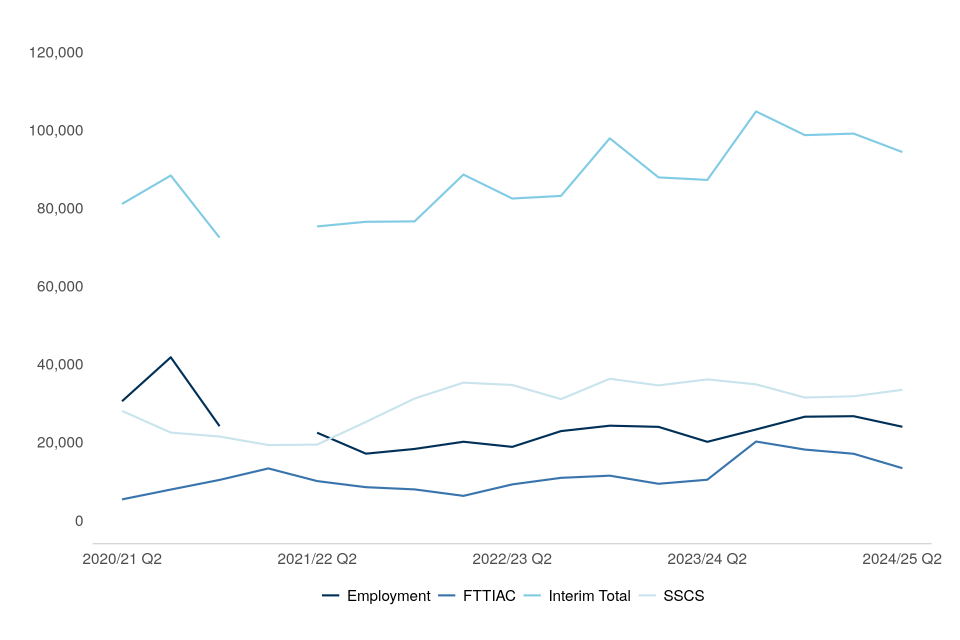
Figure 3.2: Disposals interim totals, Q2 2020/21 to Q2 2024/25 (Source: Table S_3)
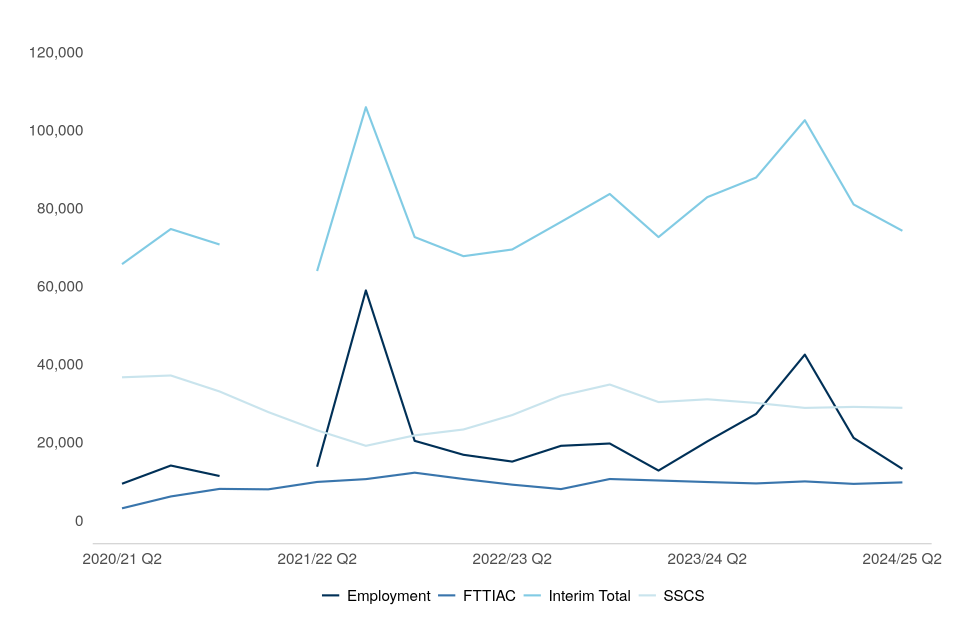
Figure 3.3: Open caseload[footnote 3] interim totals, Q2 2020/21 to Q2 2024/25 (Source: Table S_4)

The charts above show the trends in receipts, disposals and open caseload over the last five years for SSCS, FTTIAC, ET, and all tribunals (using the Interim[footnote 1] Total measure).
In July to September 2024, overall receipts increased by 8% compared to July to September 2023. This was driven by increases in Employment Tribunal (single and multiple claims), FTTIAC and SEND (by 19%, 28%, and 46% respectively).
Overall disposals decreased by 10% in July to September 2024 (to 74,000). The Employment Tribunal disposed of 35% less cases in Q2 2024/25 compared to Q2 2023/24. SSCS disposals decreased by 7% over the same period.
4. Social Security and Child Support
From April 2023 the SSCS Tribunal started to list cases using a new Scheduling and Listing solution. This, alongside HMCTS migrating to a new Strategic Data Platform, has resulted in some cases heard and decided using this new listing solution for the SSCS Cardiff not currently being included in the data. Revised, complete data will be published as soon as they are available.
SSCS receipts and disposals decreased whilst open cases increased, as receipts have continued to exceed disposals over the last year.
Compared to the same period in 2023, Social Security and Child Support (SSCS) receipts and disposals decreased by 7% each. Open cases increased by 5%.
Of the 29,000 disposals in Q2 2024/25, 59% were cleared at a hearing and of these, 60% had the initial decision revised in favour of the claimant (compared to 63% and 62% in the same period in 2023/24 respectively).
Figure 4.1: Social Security and Child Support receipts, Q2 2020/21 to Q2 2024/25 (Source: Tables SSCS_1)
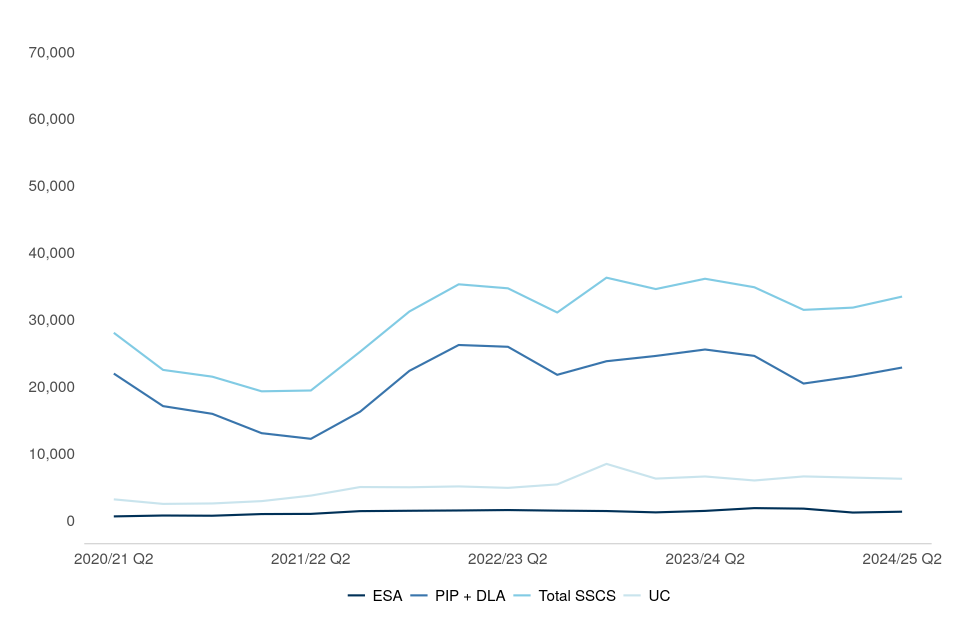
Figure 4.2: Social Security and Child Support disposals, Q2 2020/21 to Q2 2024/25 (Source: Tables SSCS_2)
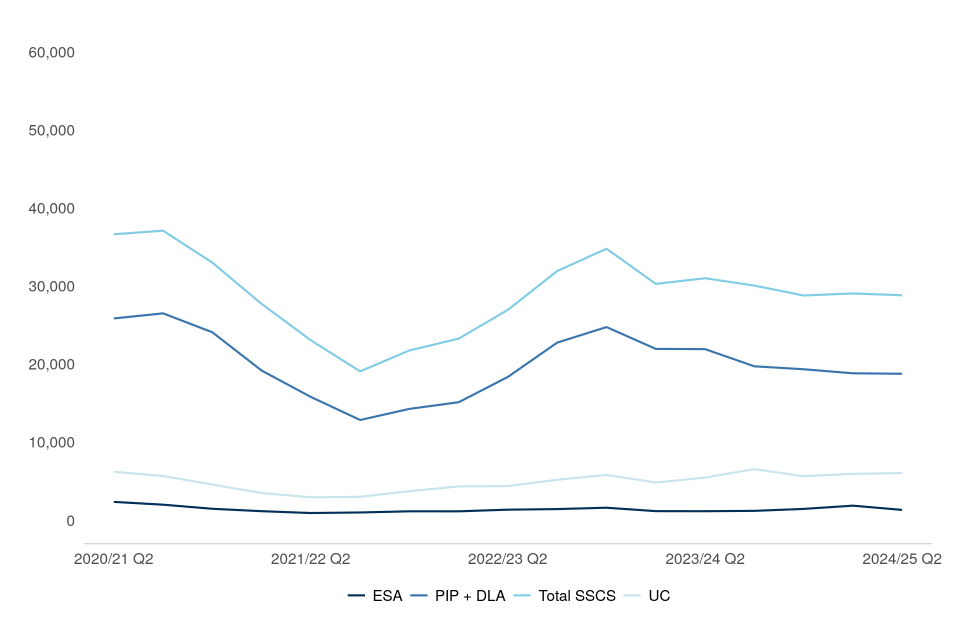
Figure 4.3: Social Security and Child Support open caseload, Q2 2020/21 to Q2 2024/25 (Source: Tables S_4)
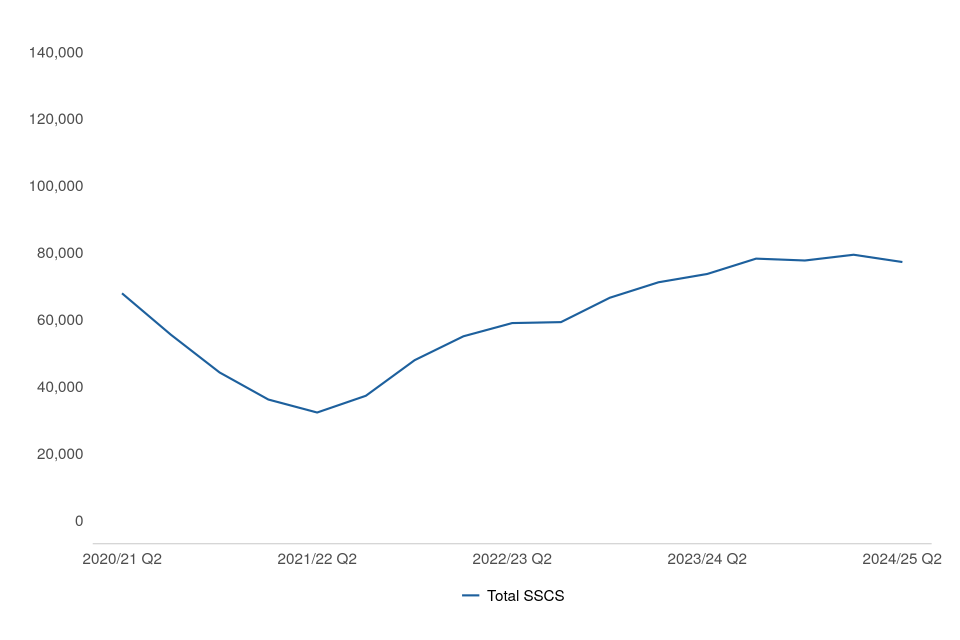
The economic impact of the COVID-19 pandemic resulted in an increase in the number of people on Universal Credit[footnote 4] (UC) as the employment rate decreased and economic inactivity increased. The Department for Work and Pensions (DWP) changes to benefit processes in response to the pandemic, such as the temporary suspension of face-to-face assessments for health and disability-related benefits, contributed to the general downward trend in receipts seen during the pandemic. As the policies put in place due to COVID-19 came to an end and restrictions were eased, SSCS receipts increased significantly from Q2 2021/22 and have remained relatively stable since Q1 2022/23.
SSCS receipts decreased by 7% this quarter, to 33,000, compared to July to September 2023. This was driven by decreases in Personal Independence Payment and Universal Credit (by 10% and 5% respectively). PIP and UC appeals accounted for 64% and 19% respectively of all SSCS receipts in July to September 2024.
In July to September 2024, SSCS disposals decreased by 7% when compared to the same period in 2023 (from 31,000 in Q2 2023/24 to 29,000 in Q2 2024/25). PIP made up nearly two thirds (62%), and UC, around a fifth (21%) of SSCS disposals.
Of the disposals made by the SSCS tribunal, 17,000 (59%) were cleared at hearing, and of these, 60% were overturned in favour of the claimant (down from 63% and down from 62% on the same period in 2023 respectively). This overturn rate varied by benefit type, with PIP at 68%, Disability Living Allowance (DLA) 57%, Employment Support Allowance (ESA) 48%, and UC 51%. The PIP, DLA, ESA and UC overturn rates mostly decreased or remained stable compared with July to September 2023 (DLA down 1 and ESA down 2 percentage points, whilst PIP and UC remained stable).
There were 77,000 SSCS open caseload at the end of September 2024, an increase of 5% compared to the same period in 2023. SSCS open caseload decreased gradually between Q4 2017/18 and Q2 2021/22 (from a peak of 125,000 to 32,000), only rising in Q3 2019/20. However, since Q2 2021/22, SSCS open caseload started to rise again, increasing each quarter except Q4 2023/24 and this current quarter.
Of those cases disposed of by the SSCS tribunal in July to September 2024, the mean age of a case at disposal was 30 weeks, a 4-week increase compared to the same period in 2023 (see table T_2).
5. Immigration and Asylum
First-tier Tribunal Immigration and Asylum Chamber (FTTIAC)
In July to September 2024, FTTIAC receipts increased by 28% to 13,000, compared to Q2 2023/24. Disposals remained stable (at 9,700), over the same period.
In the same period, open caseload increased by 104% (to 63,000).
Figure 5.1: First-tier Tribunal Immigration and Asylum Chamber receipts, Q2 2020/21 to Q2 2024/25 (Source: Tables FIA_1)
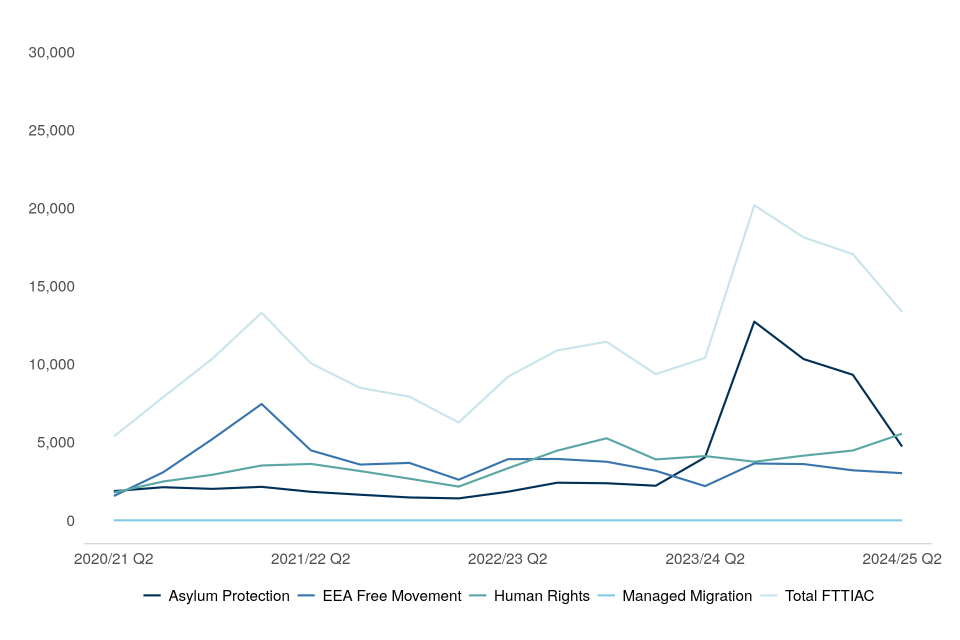
Figure 5.2: First-tier Tribunal Immigration and Asylum Chamber disposals, Q2 2020/21 to Q2 2024/25 (Source: Tables FIA_2)
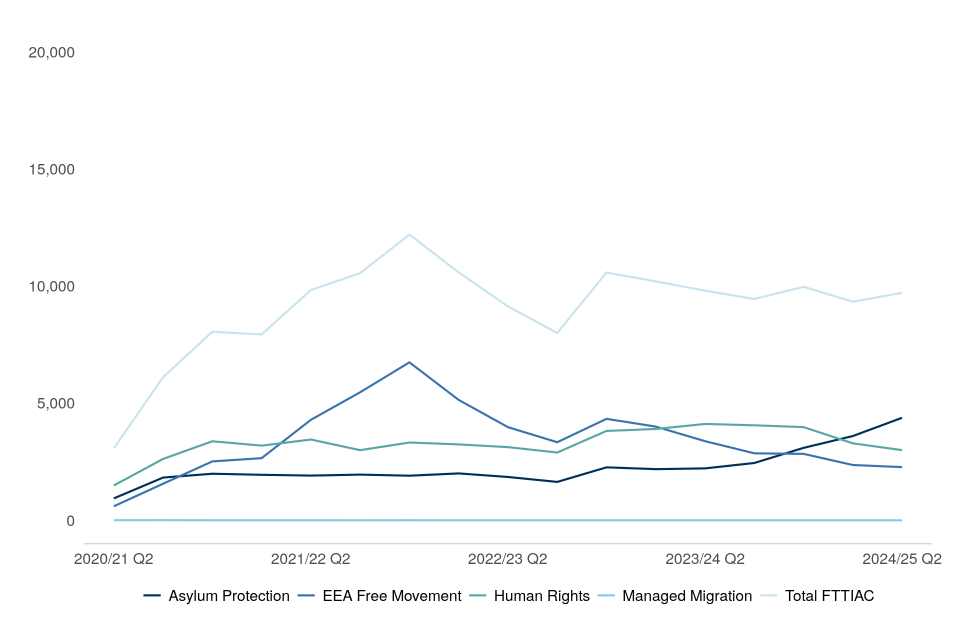
Figure 5.3: First-tier Tribunal Immigration and Asylum Chamber open caseload, Q2 2020/21 to Q2 2024/25 (Source: Tables S_4)

This quarter receipts increased by 28% (to 13,000) compared to the same period last year, predominantly driven by increases in Human Rights (by 35%). Following a steep fall in 2020/21 due to the impact of the pandemic, FTTIAC receipts started to return to pre-COVID-19 levels over the course of 2020/21. In 2021/22, FTTIAC receipts increased by 52% (to 40,000) compared to 2020/21 and over the course of 2022/23 decreased by 5% (to 38,000). After a period of stability in 2022/23, receipts rose steeply in Q3 2023/24 (to 20,000) driven by increases in Asylum/Protection/Revocation of Protection following the Home Office’s work to tackle the backlog of legacy asylum claims. While the number of receipts received for Asylum/Protection/Revocation of Protection remains elevated, up 17% in the current quarter compared to Q2 2023/24, the increase is at a much lower rate than previous quarters.
Human Rights (HR) receipts increased by 35% to 5,500 over the same period. HR and AP proportionally represented 42% and 35% of all FTTIAC receipts respectively (up 2 and down 3 percentage points respectively from a year ago).
In Q2 2024/25, FTTIAC disposals remained stable at 9,700. Disposals fell in several case types, with decreases in Human Rights and EEA Free Movement (by 27% and 33% respectively). However, this was offset by a 97% rise in Asylum/Protection/Revocation of Protection disposals, which made up the largest proportion (45%) of all FTTIAC disposals in July to September 2024, up from 23% a year ago.
Of the disposals made in the FTTIAC this quarter, 65% were determined i.e. a decision was made by a judge at a hearing or on the papers (compared to 69% in Q2 2023/24); 19% were withdrawn (compared to 19% in Q2 2023/24); 3% were struck out for non-payment of the appeal fee (compared to 3% in Q2 2023/24), and 5% were invalid or out of time (compared to 4% in Q2 2023/24). Around half (46%) of the 6,300 cases determined at a hearing or on the papers were allowed/granted, although this varied by case type (47% of Asylum/Protection, 51% of Human Rights and 36% of EEA Free Movement appeals were allowed/granted).
In the FTTIAC, the mean time taken to clear appeals across all categories was at 44 weeks in the latest quarter, 1 week longer compared to the same period a year ago. Asylum/Protection, Human Rights and EEA Free Movement had mean times taken of 42 weeks, 46 weeks and 44 weeks respectively.
Upper Tribunal Immigration and Asylum Chamber Judicial Reviews (UTIAC JRs)
In July to September 2024, there were 850 Immigration and Asylum Judicial Review receipts and 1,200 disposals, an increase of 43% and an increase of 56% respectively on July to September 2023.
Of the 1,200 Immigration and Asylum Judicial Reviews disposed of, 49% were determined. The remaining 51% were in the ‘Other’ category, which includes cases that were withdrawn or not served.
During July to September 2024, 590 UTIAC Judicial Review applications were determined by paper hearing, of which 18% were allowed to continue to the substantive hearing stage. A further 78 were reconsidered at an oral renewal, of which 82% were allowed to continue to the substantive hearing stage. There were 14 substantive hearings which were determined in July to September 2024 of which 43% were granted in favour of the appellant (see table UIA_3).
Over the last year, disposals exceeded receipts, leading to a fall in open caseload of 3%, to 1,400, compared to July to September 2023.
6. Employment Tribunals
Employment Tribunal single cases
In Q2 2024, the Employment Tribunal received 10,000 single claim receipts and disposed of 7,200 single claim cases. There were 40,000 single claim cases in the open caseload at the end of September.
Employment Tribunal lead multiple cases
There were 510 lead multiple cases received and 520 cases disposed of in Q2 2024. The number of open lead cases stood at 6,700 at the end of September.
Employment Tribunal multiple cases
This quarter there were 14,000 Multiple claim receipts, 5,900 disposals and the open caseload stood at 420,000 at the end of September.
Employment Tribunals transitioned to a new database (Employment Case Management) during March to May 2021. It has not been possible to provide full results from both databases during this migration period on a consistent basis. Therefore, Employment Tribunal (ET) data is not available for Q1 2021/22, and as a result we are unable to present data for the full financial year of 2021/22.
From September 2022, the Employment Tribunal migrated to a new case management system (ECM Reform). Due to the migration process, the data on Employment Tribunals does not include jurisdictional breakdown for receipts or disposals. The Employment Tribunal timeliness cannot be provided due to there being no jurisdictional data. The data will be made available as soon as possible when the data is extracted and quality assured.
In Q2 2024/25, there were 24,000 Employment Tribunals (ET) receipts, 42% (10,000) of which were single claims receipts, and the remaining 58% (14,000) were multiple claims receipts, within 510 lead multiple cases. The ET disposed of 13,000 cases in Q2 2024/25, of which 7,000 were single claim disposals and 6,000 multiple claims disposals. At the end of Q2 2024/25, there were 461,000 open cases.
Figure 6.1: Index of Employment Tribunals single and multiple claim receipts, Q2 2020/21 to Q2 2024/25 (Source: Tables S_2)
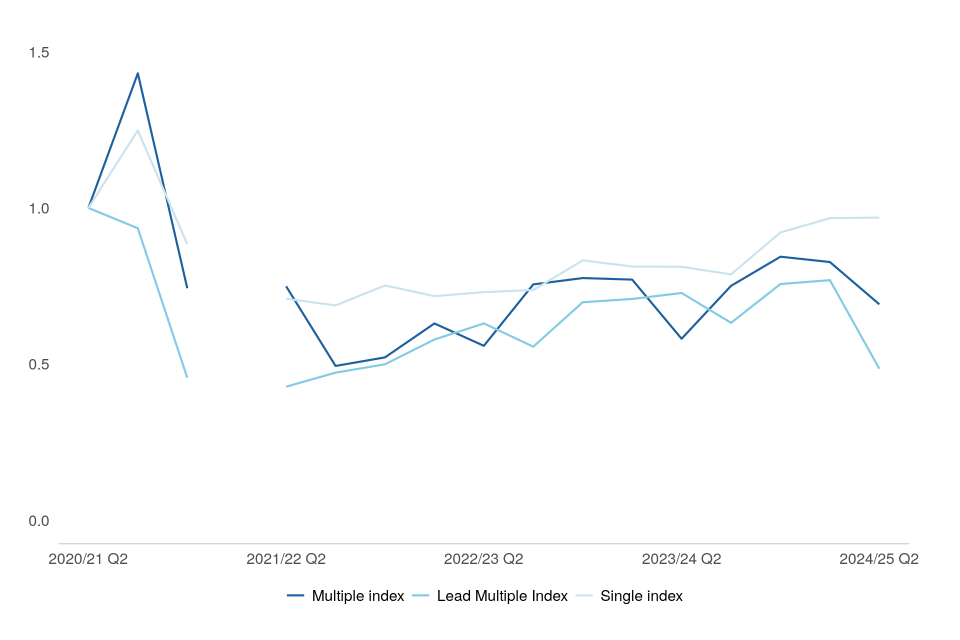
- Baseline 2020/21 Q2
Figure 6.2: Index of Employment Tribunals single and multiple claim disposals, Q2 2020/21 to Q2 2024/25 (Source: Tables S_3)
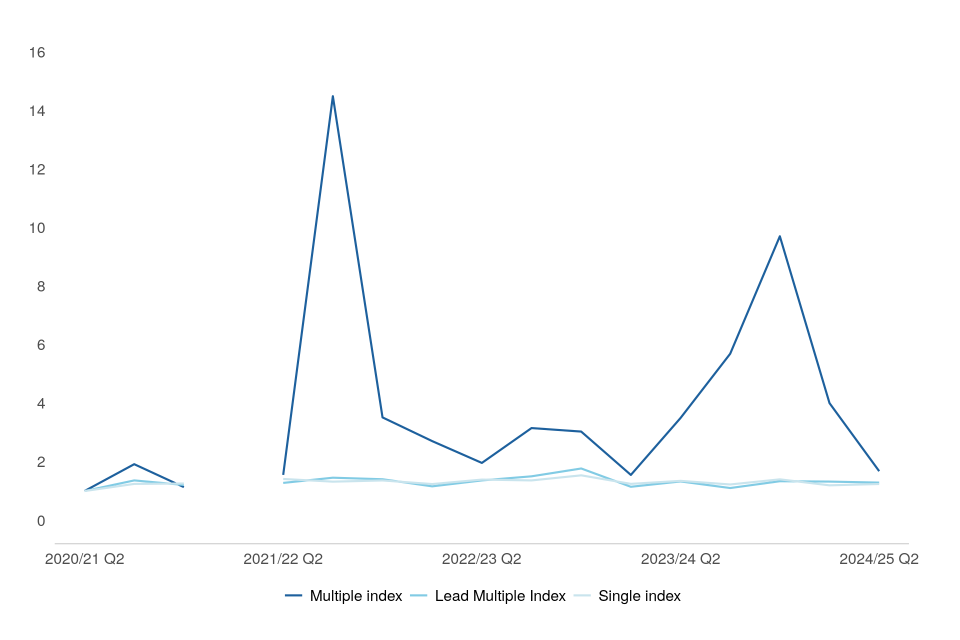
- Baseline 2020/21 Q2
Figure 6.3: Index of Employment Tribunals single and multiple claims open caseload, Q2 2020/21 to Q2 2024/25 (Source: Tables S_4)
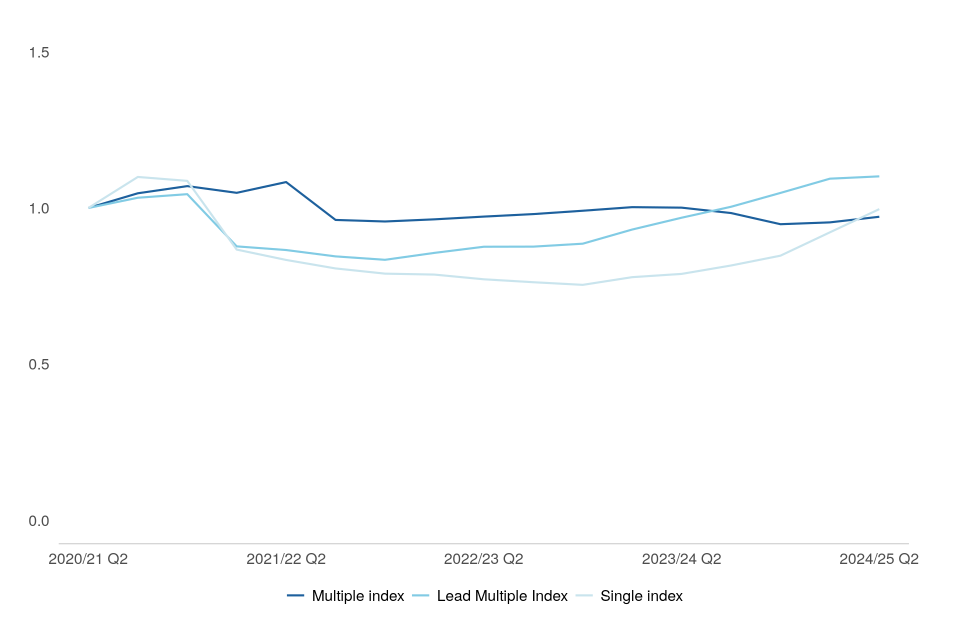
- Baseline 2020/21 Q2
Single claim open caseload (at 40,000) remains below the peak of 44,000 in Q3 2020/21, although this is up 26% compared to the same period in 2023/24.
There were 14,000 multiple claims received this quarter. Multiple claims tend to be more volatile as they can be skewed by a high number of claims against a single employer.
The peaks seen in the disposal chart in Q3 2021/22, Q3 2023/24 and Q4 2023/24 are due to large spikes in multiple claims:
- A dismissal judgment was issued in December 2021 for 48,000 British Airways claims covering 71,000 jurisdictions. These claims had been withdrawn over a number of years but given the volume and restrictions with the old case management system these had not been formally closed until now, hence the spike. This figure is expected to be revised again as there is still closure action to take place on some of the claims.
- Between November 2023 and March 2024 a bulk case of multiple claims for equal pay against Glasgow City Council have been settled and subsequently withdrawn, resulting in the spike in disposals in Q3 and Q4 2023/24.
7. Gender Recognition Certificates
350 Gender Recognition Panel (GRP) applications were received and 340 were disposed of between July to September 2024; 900 applications were pending by the end of September 2024
The GRP received 350 applications this quarter, a decrease of 23 applications compared to July to September 2023. Of the 340 applications disposed of, a full Gender Recognition Certificate (GRC) was granted in 87% of cases (290 full GRCs), down 2 percentage points compared to the same period in 2023 (where 420 full GRCs were granted out of 460 disposals).
As expected, GRP receipts have increased annually since 2017/18, following a reduction in the application fee in May 2021 from £140 to £5, and the move to an online application process in July 2022. This has come at the same time as an increase in both the open caseload and refusals. Open caseload reached 900 cases in Q2 2024/25, while 8% of all disposals (28 cases) have been refused. Applications can be refused if they do not meet the required criteria. More information on the criteria can be found at the following link: Apply for a Gender Recognition Certificate - GOV.UK (www.gov.uk) (URL:https://www.gov.uk/apply-gender-recognition-certificate).
Since April 2005/06, when the Gender Recognition Act 2004 came into effect, 63% of interim certificates (170 of the 270 interim GRCs granted) have been converted to a full GRC, 52% of which were converted within 30 weeks. No interim certificates were converted to a full GRC between July to September 2024. The Divorce, Dissolution and Separation Act (2020), which took effect from 6th April 2022, changed the process for no fault divorces, reducing the need for interim certificates; we therefore expect to see a considerable drop in these. Of the 290 full certificates granted in July to September 2024, 28 were for married applicants and 260 for single applicants. 160 (54%) of the individuals granted full certificates were registered male at birth while 130 (46%) were registered female at birth.
Figure 7.1: Applications for Gender Recognition Certificates received, disposed of and pending, Q2 2020/21 to Q2 2024/25 (Source: Tables GRP_1 and GRP_2)
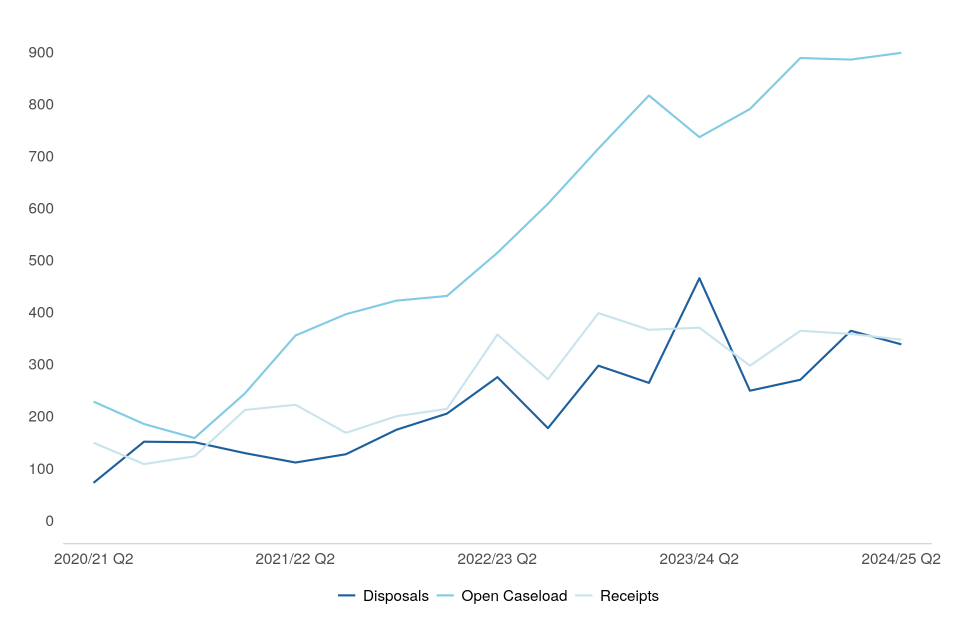
Figure 7.2: Full Gender Recognition Certificates granted by year of birth, 2018/19 to 2023/24 (Source: Table GRP_4)
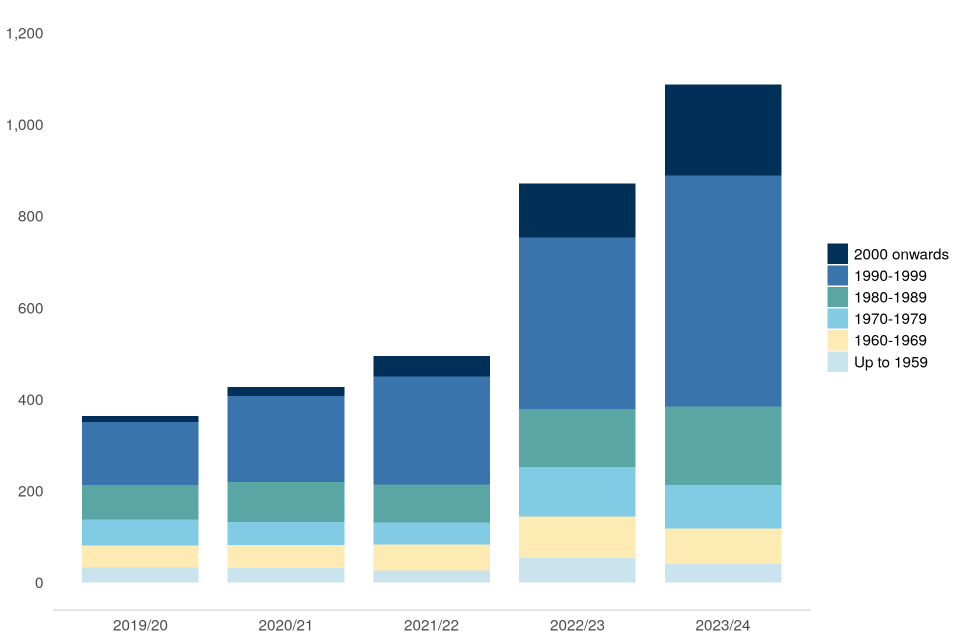
8. Annual Special Educational Needs and Disability (SEND) Statistics
55% increase in registered SEN appeals when compared to 2022/23 academic year
In the academic year 2023/24, HMCTS tribunals recorded 21,000 registered SEN appeals, an increase of 55% when compared to the prior year. In the same period, 17,000 SEN appeals were disposed of, an increase of 43% on 2022/23.
Figure 8.1: Registered SEN appeals, 2015/16 to 2023/24 academic years (Source: Table SEND_1)[footnote 5]
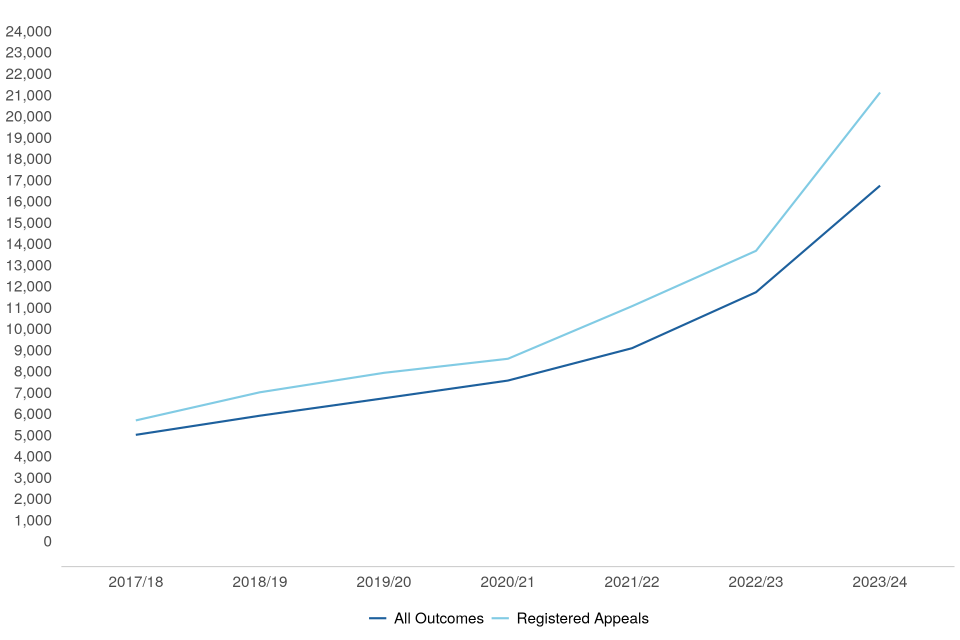
Of the 21,000 registered SEN appeals in 2023/24, 27% were against ‘refusal to secure an EHC assessment’, while a total of 59% were in relation to the content of EHC plans.
Most Education, Health and Care plans (EHCP) and assessments are concluded without a Tribunal hearing. Nationally, in 2023, there were 15,600 appeals to the Tribunal, equating to 2.5% of all appealable decisions subsequently resulting in Tribunal appeals[footnote 6].
The increase in appeals registered is likely a combination of:
- the continued effect of the 2014 SEN reforms, which introduced Education, Health and Care plans (EHCPs) and extended the provision of support from birth to 25 years of age
- the expansion of the Tribunal’s powers to make non-binding recommendations on health and social care (where there is a valid appeal on an educational element of the plan)
- the growth in the number of families seeking EHC plan assessments and subsequently the rise in the number of children and young people with an EHC plan
SEND open caseload reached a new high of 11,000 cases in Q2 2024/25 financial year, driven by the previously noted rising trend in SEND appeals registered. This figure should be used with caution because, as the SEND volumes have grown, we are aware in some appeals the nature of educational needs which is manually extracted are being wrongly classified as Moderate Learning Difficulty (MLD). We are investigating this and hope to improve the accuracy in subsequent publications.
Figure 8.2: SEND Open Caseload, Q2 2018/19 to Q2 2024/25 (Source: Table S_4)[footnote 7]
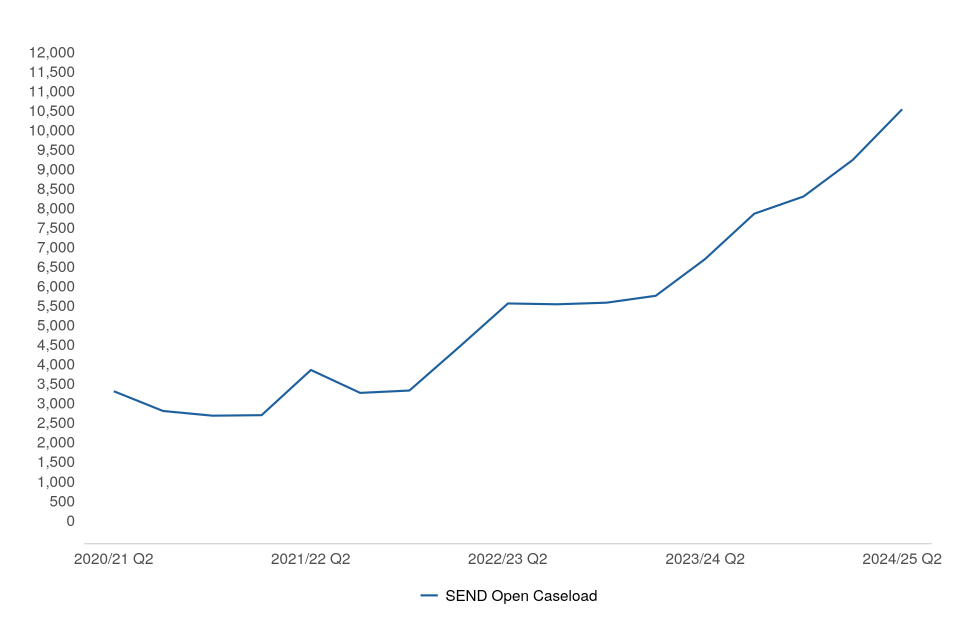
In 2023/24, HMCTS recorded 17,000 outcomes in relation to SEN appeals, an increase of 43% compared to 2022/23. Of these outcomes, 67% (11,000) of cases were decided by the tribunal, down 1 percentage points on 2022/23. Of the cases decided, 99% (11,000) were in favour of the appellant, up 1 percentage point on 2022/23. These are cases where the appellant wins the majority of the appeal (i.e. the appellant may be successful in 2 out of the 3 sections they appeal against). Work has been undertaken to provide further breakdowns of this data for section I appeals, please see table Send_11 in the SEND annual tables published alongside this bulletin.
In 2023/24, there were 360 registered appeals in relation to disability discrimination, 30 more than the previous year (9% increase). Of these appeals, 24 (7%) were related to temporary exclusion from school and the remainder were uncategorised.
The SEND tribunals disposed of 170 Disability Discrimination claims in 2023/24, up from 160 in the previous year (6% increase). Of these disposals, 81 claims (47%) were decided at hearing, 85 appeals (50%) were withdrawn prior to the hearing taking place, and 5 appeals were conceded. Of those decided at hearing, 37% were dismissed and 63% upheld – compared to 64% dismissed and 36% upheld in 2022/23.
Of the 700 Section I decision notices analysed for academic year 2023/24, 240 (34%) resulted in the parent preference, 200 (28%) resulted in the parent and LA preference (this is when, at a hearing, the LA agrees with the parent), 87 (12%) resulted in the LA preference and 54 (8%) resulted in neither (this is when the type of school is in contention and the court determines the type of school), whilst the rest (18%) could not be determined, either due to the absence of relevant information within the decision notice or limitations of the data science method used.
9. Further information
Rounding convention
Figures greater than 10,000 are rounded to the nearest 1,000, those between 1,000 and 10,000 are rounded to the nearest 100 and those between 100 to 1,000 are rounded to the nearest 10. Less than 100 are given as the actual number.
Accompanying files
As well as this bulletin, the following products are published as part of this release and can be accessed here:
-
A supporting document providing further information on how the data is collected and processed, as well as information on the revisions policy and legislation relevant to trends and background on the functioning of the tribunal system.
-
The quality statement published with this guide sets out our policies for producing quality statistical outputs for the information we provide to maintain our users’ understanding and trust.
-
A set of overview tables, covering each section of this bulletin and an annual set of tables covering further breakdown of Special Educational Needs and Disability statistics for the Academic Year 2023/24.
-
A set of CSV files including data on overall receipts and disposals CSV, covering all tribunal types.
-
Additional releases this quarter:
- Update to the statistical notice on Immigration and Asylum (I&A) Detained Immigration Appeals (DIA) to include data to Q2 2024/25.
Future publications
Our statisticians regularly review the content of publications. Development of new and improved statistical outputs is usually dependent on reallocating existing resources. As part of our continual review and prioritisation, we welcome user feedback on existing outputs including content, breadth, frequency and methodology. Please send any comments you have on this publication including suggestions for further developments or reductions in content.
Official Statistics
Our statistical practice is regulated by the Office for Statistics Regulation (OSR).
OSR sets the standards of trustworthiness, quality and value in the Code of Practice for Statistics that all producers of official statistics should adhere to.
You are welcome to contact us directly with any comments about how we meet these standards.
Alternatively, you can contact OSR by emailing regulation@statistics.gov.uk or via the OSR website.
Contact
Press office - email: pressofficecourtslaw@justice.gov.uk
Other enquiries and feedback on these statistics should be directed to the Courts and People division of the Ministry of Justice:
Rita Kumi-Ampofo or Laura Jones - email: CAJS@justice.gov.uk
Next update: 13 March 2025 (URL: www.gov.uk/government/collections/tribunals-statistics)
© Crown copyright Produced by the Ministry of Justice
For any feedback on the layout or content of this publication or requests for alternative formats, please contact CAJS@justice.gov.uk
-
The interim totals for the overall volumes of tribunal receipts, disposals and open caseload exclude the Upper Tribunal (Immigration and Asylum Chamber) for which the data is currently not available. See the main tables S_2, S_3 and S_4 for more information. ↩ ↩2 ↩3
-
Includes single and lead multiple Employment Tribunal cases. ↩
-
Open caseload is based on a snapshot in time based on the last day of each quarter. ↩
-
The underlying data for Figure 8.1 is the Special Educational Needs (SEN) appeals and outcomes for each academic year (1st September to 31st August) which can be found in SEND_1. ↩
-
Source: SEND Tribunal tables: statistics on the appeal rate to the SEND Tribunal table in Tribunals statistics quarterly: January to March 2024 publication. ↩
-
The underlying data in Figure 8.2 for the caseload outstanding trendline is from the Special Educational Needs and Disability (SEND) caseload outstanding as at Q2 of each year which can be found in S_4 of the main tables. ↩
